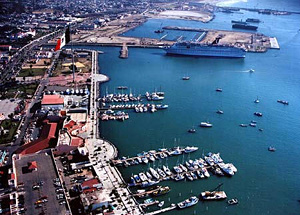 |
 |
 |
 Business News | August 2006 Business News | August 2006  
Process to Develop Megaport May Start
 Diane Lindquist - Union-Tribune Diane Lindquist - Union-Tribune


| | Port of Ensenada |
Baja California Gov. Eugenio Elorduy Walther has announced that a competition to develop a port and rail line near Ensenada will begin in three weeks, but a continuing disagreement over mineral rights at the proposed Punta Colonet port site could make that unlikely.

“Right now, the governor's declaration, we don't see it as well-informed,” said Gabriel Chávez, who is among a group that holds mining concessions off the coast. “We are concerned about investors coming to Colonet and being misled.”

Chávez said yesterday he and his partners have been negotiating during the past weeks with federal officials in charge of the bidding competition to find a way to allow the port development yet retain their right to extract minerals from the ocean. The talks stalled Thursday.

“They kicked us out of the office,” Chávez said.

Jesús Lara, who represents five communal farming groups, or ejidos, that own land at Punta Colonet, also was a party to the talks and said yesterday, “The negotiations broke down completely.”

Elorduy said in a news statement Friday afternoon and on television appearances over the weekend that high-ranking federal officials had told him the bidding process to develop the Punta Colonet port and railroad would start in three weeks.

“In the opinion of industry specialists, this would be the largest infrastructure project ever developed in the history of our country,” Elorduy said.

The port project, about 150 miles south of San Diego, is expected to attract major maritime and rail companies from across the United States and Asia.

Its development is being driven by the inability of other West Coast ports, especially those in Long Beach and Los Angeles, to handle a surge in cargo from eastern Asia. Shipments from that region to the United States are growing by 15 percent annually and are expected to double by 2020.

Punta Colonet is envisioned as serving only containerized cargo ships, which would off-load containers to rail cars that would carry the goods on a line built to connect with existing lines at the U.S.-Mexico border near Mexicali.

Investment in the port and rail line could total $4 billion to $5 billion, Mexican officials say, but additional infrastructure and the development of a city with as many as 200,000 residents geared at supporting the industrial activity could cost as much as $22 billion.

Guillermo Martínez Villareal, a spokesman for Elorduy, said yesterday that he did not know the status of the negotiations involving the mineral rights or how the bid would be structured.

“I don't have the details because it's a federal bidding process,” he said.

Cesar Patricio Reyes, the Secretariat of Communications and Transportation official in charge of the bidding process, did not return a phone call seeking comment.

Attempts to reach him also have been unsuccessful during the past 1½ months since Chávez declared that his mining concession makes the port project unfeasible.

Chávez and his partners, who he declines to identify, gained the mineral rights several months ago under a new law that allows mining on the ocean floor. Chávez claims significant deposits of titanium and iron exist in the area where the federal government wants the port to be developed.

President Vicente Fox was expected to start the bidding process during a visit to Ensenada in early June. Subsequently, Reyes announced the project was being delayed “three or four months maximum.”

According to Chávez and Lara, negotiations with the federal government have been continuing since then to resolve the issue. A representative of Elorduy has been present at the talks, including the meeting that broke down Thursday, Chávez said.

Before then, he said, it appeared the parties were close to reaching an agreement. The mining group had tentatively agreed to give up 7,400 acres of property off the coast of Punta Colonet for the port development out of a total of 74,000 acres in mining concessions that Chávez and his unnamed partners hold.

“We agreed that they would facilitate our project if we agreed on the (7,400 acres) and both projects would be coordinated,” he said.

On Thursday, the mining group brought a new proposal and a new partner to the table. With a company Chávez identified as SAS Marine, which he said was the top port developer in Mexico, the group asked to be granted nine docks for private development in return for building a 4.3-mile breakwater valued at about $1 billion.

“The rest would be under government administration. We would build and maintain our terminal, and they would do theirs,” Chávez said. “They didn't want to do that.”

Elorduy's announcement has confounded the parties, he said.

“He's very well aware of what happened. They are selling the project now,” Chávez said. “For now, the negotiations are over. . . . The way they are proposing it is not proper.”

Although he believes an agreement can be reached, Chávez said that if the project is let out for bid beforehand, “then we would take legal actions.”

Diane Lindquist: (619) 293-1812; diane.lindquist@uniontrib.com | 
 | |
 |



